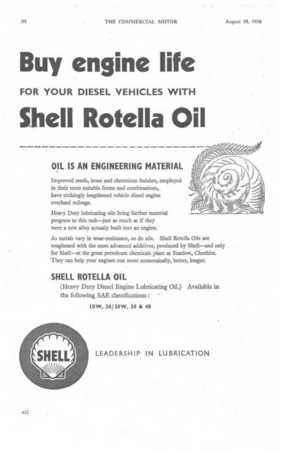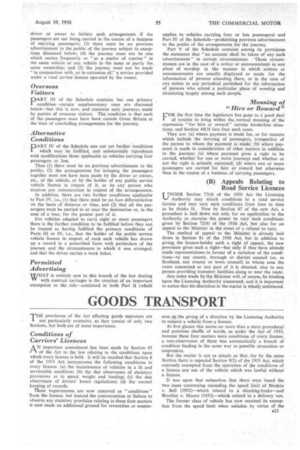Buy engine life
Page 56

Page 57

If you've noticed an error in this article please click here to report it so we can fix it.
FOR YOUR DIESEL VEHICLES WITH
Shell RoteIla Oil
driver or owner to initiate such arrangements if the re passengers are not being carried in the course of a business ss of carrying passengers; (3) there must be no previousxc one which to the public of the journey subject to exceptions discussed below; (4) the journey must not be which occurs frequently or "as a matter of routine" in the same vehicle or any vehicle in the same or partly thefl same ownership; and (5) the journey must not be made "in conjunction with, or in extension of," a service provided under a road service licence operated by the owner.
Overseas Visitors
PART Ill of the Schedule contains but one primary condition—certain supplementary ones are discussed w, and c below—but this is new, only journeys made by parties of overseas visitors. The condition is that each of the passengers must have been outside Great Britain at the time of concluding arrangements for the journey.
Alternative Conditions
D ART IV of the Schedule sets out yet further conditions I which may be fulfilled, and substantially reproduces with modifications those applicable to vehicles carrying four passengers or less. Thus (1) there must be no previous advertisement to the public; (2) the arrangements for bringing the passengers together must not have been made by the driver or owner, etc., of the vehicle, or by the holder of any public service vehicle licence in respect of it, or by any person who receives any remuneration in respect of the arrangements. In addition, there are two further conditions applicable to Part IV, i.e.; (1) that there must be no fare differentiation on the basis of distance or time, and (2) that all the passengers must be carried to or near the destination or, in the case of a tour, for the greater part of it. For vehicles adapted to carry eight or more passengers there is the further condition to be fulfilled before they can be treated as having fulfilled the primary conditions of Parts III or IV, i.e., that the holder of the public service vehicle licence in respect of each such vehicle has drawn up a record in a prescribed form with particulars of the journey and the circumstances in which it was arranged, and that the driver carries a work ticket.
Permitted Advertising
ly HAT is entirely new to this branch of the law dealing VT with contract carriages is the creation of an important exemption to the rule—contained in both Part II (which applies to vehicles carrying four or less passengers) and Part IV of the Schedule—prohibiting previous advertisement to the public of the arrangements for the journey. Part V of the Schedule contains among its provisions the statement that "no account shall be taken of any such advertisement " in certain circumstances. Those circumstances are in the case of a notice or announcement in any place of worship in the manner in which notices or announcements are usually displayed or made for the information of persons attending there, or in the case of any notice in any periodical published for the information of persons who attend a particular place of worship and circulating largely among such people.
Meaning of "Hire or Reward"
FOR the first time the legislature has gone to a good deal I of trouble to bring within the normal meaning of the expression "for hire or reward" certain borderline situations, and Section 40(3) lists four such cases. They are: (a) where payment is made for, or for matters which include the carrying of passengers, irrespective of the person to whom the payment is made; (b) where payment is made in consideration of other matters in addition to the journey; (c) where payment gives a right to be carried, whether for one or more journeys and whether or not the right is actually exercised; (d) where one or more passengers are carried for hire or reward but otherwise' than in the course of a business of carrying passengers.
(B) Appeals Relating to Road Service Licences TNDER Section 72(4) of the 1930 Act the Licensing %.1 Authority may attach conditions to a road service licence and may vary such conditions from time to time as he thinks fit. Now by Section 47 of the new Act, a procedure is laid down not only for an application to the Authority to exercise the power to vary such conditions given by Section 72(4) of the 1930 Act, but also for an appeal to the Minister in the event of a refusal to vary. The method of appeal to the Minister is already laid down in Section 81 of the 1930 Act, but in addition to giving the licence-holder such a right of appeal, the new provision gives such a right—but only if they have already made representations-in favour of a variation of the conditions—to any county, borough or district council (or, in Scotland, any county or town council) in whose area the route concerned or any part of it is situated, also to any person providing transport facilities along or near the route. Any order made by the Minister will, of course, be binding upon the Licensing Authority concerned, and it is important to notice that his discretion in the matter is wholly unfettered.




































































































